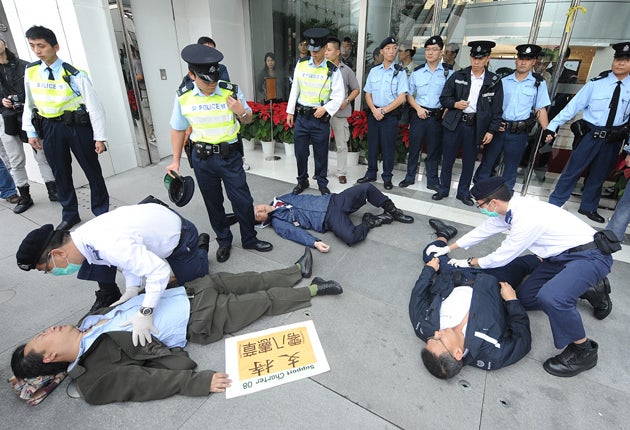Eleven-year jail sentence for Chinese dissident
Conviction for 'subverting state power' comes after trial that lasted two hours

Your support helps us to tell the story
From reproductive rights to climate change to Big Tech, The Independent is on the ground when the story is developing. Whether it's investigating the financials of Elon Musk's pro-Trump PAC or producing our latest documentary, 'The A Word', which shines a light on the American women fighting for reproductive rights, we know how important it is to parse out the facts from the messaging.
At such a critical moment in US history, we need reporters on the ground. Your donation allows us to keep sending journalists to speak to both sides of the story.
The Independent is trusted by Americans across the entire political spectrum. And unlike many other quality news outlets, we choose not to lock Americans out of our reporting and analysis with paywalls. We believe quality journalism should be available to everyone, paid for by those who can afford it.
Your support makes all the difference.China's most prominent democracy activist, Liu Xiaobo, was yesterday given 11 years in jail for subversion, one of the harshest sentences ever given out for dissent in China and a sign that the Communist Party is not willing to relax its iron grip on power.
The Christmas Day sentence was handed down for the vague offence of "subverting state power", a charge routinely used to jail dissidents. Mr Liu, who marks his 54th birthday on Monday and used to be a professor at Beijing Normal University, was one of the founding signatories of Charter 08, which is the closest thing to a pro-democracy movement that China has seen for years. It has called for a constitution guaranteeing human rights, the open election of public officials, and freedom of religion and expression.
The courts are effectively run by the Communist Party and were never likely to disagree with the prosecution's arguments, especially in a politically sensitive case like that of Liu Xiaobo.
He was detained a year ago, just before the release of the charter last December. More than 300 people, including some of China's leading intellectuals, signed the document.
Mr Liu previously spent nearly two years in jail for joining the 1989 student-led protests in Tiananmen Square. He also prevented still more bloodshed on the square by successfully negotiating the evacuation of the last remaining students with the army in the early morning of 4 June.
Both the European Union and the United States had appealed to Beijing to free Mr Liu, but the Chinese government rejected the calls and accused the EU and the US of trying to meddle in China's legal system.
The Chinese foreign ministry referred to calls for Mr Liu's release as "a gross interference in China's internal affairs".
The sentence was handed down by the No. 1 Intermediate People's Court in Beijing following a trial on Wednesday that lasted only two hours. Mr Liu was charged with "serious" crimes and could have been sentenced to up to 15 years in prison.
The text of Charter 08 included a direct reference to the events of 1989 as an example of the "long trail of human rights disasters" caused by the Communist Party's monopoly on power. About 10,000 people have signed the document.
Since he was jailed in 1989, Mr Liu has spent most of his time either in prison or under close monitoring by security officials. He has remained a constant thorn in the side of the central government in Beijing for his calls for greater democracy in China.
"The guilty verdict demonstrates once again the Chinese authorities' intolerance for free expression and their incapacity to respond constructively to critical voices," said Sharon Hom, executive director of Human Rights in China. "But the Chinese government must recognise that the free pass on human rights that it has been receiving from the international community will not insulate it forever from the growing demands of its own people for freedom and democratic reforms."
Mr Liu's wife, Liu Xia, has not seen or spoken to her husband since March when police arranged a short, supervised meeting for the couple in a Beijing hotel room.
The American government has been active in trying to secure his release. More than a dozen diplomats tried to attend the trial but were refused access.
Join our commenting forum
Join thought-provoking conversations, follow other Independent readers and see their replies
Comments